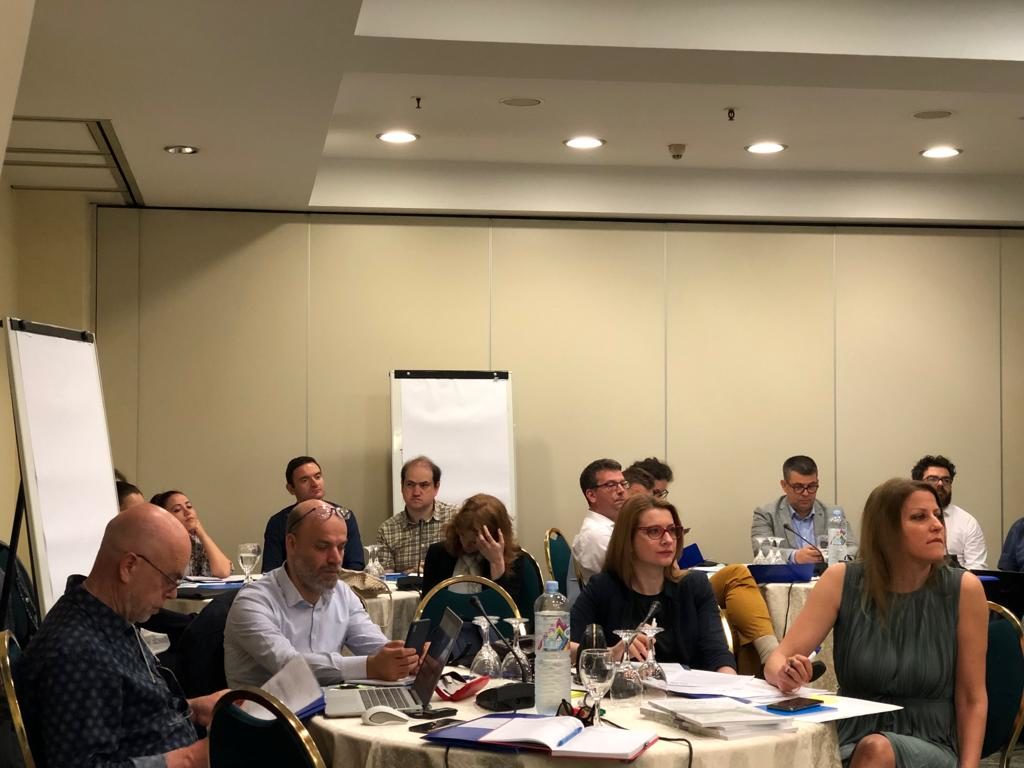The Western Balkan Network for Territorial Governance – a regional initiative for cooperation
On December 2021, the Regional Studies Association (RSA) published a blog for our network. You may see the blog in the following link: The Western Balkan Network for Territorial Governance – a regional initiative for cooperation
TG-WeB Annual Meeting: Territorial Agenda 2030: What does it bring to the Western Balkans?
4th annual meeting, hosted by IPoP, Institute for Spatial Policies, Slovenia
3-4 June 2021
During the German EU Presidency, two key documents were adopted in late November and early December 2020: the New Leipzig Charter, providing a key policy framework document for sustainable urban development in Europe, and the Territorial Agenda 2030, underlining the importance of strategic spatial planning and calling for strengthening the territorial dimension of sector policies at all governance levels.
Due to its relevance for territorial governance, we propose to focus our workshop this year on the Territorial Agenda 2030 and a set of six pilot actions, that were launched with it. As the pandemic threatens to further intensify spatial and social inequalities in Europe and to push important measures for sustainable spatial development into the background, the Territorial Agenda 2030 can provide important impetus for a future-oriented restart.




How is Territorial Agenda 2030 relevant for Western Balkans? How can this part of Europe take part in its implementation? Through this event we have:
1. Shared our research, reflections or experience from our practice, relevant for the implementation of Territorial Agenda 2030;
2. Discussed how the Territorial Agenda 2030 can contribute to territorial governance in the Western Balkans;
3. Formulated the proposal on the role of the Western Balkans for the implementation of the Territorial Agenda 2030, to be presented to the Slovenian EU Presidency;
4. Prepared a proposal about the participation of the Western Balkans Network on Territorial Governance in the pilot actions of the Territorial Agenda 2030 (paper coming soon).
TG-WeB annual meeting: Webinar on Territorial Governance for Uncertainty
25 September, 2020
This year’s TG-WeB workshop takes place virtually, through the webinar organized by InTER, Serbia.
Link for ZOOM: https://us02web.zoom.us/j/88530363970
Given the unusual circumstances caused by the COVID-19 pandemic and the uncertainties ahead for all countries, as a network we believe that governance should not only adapt to the situation, but also take into regard a number of societal challenges. Through this event we will:
- Share
research and bottom-up facts on the effects of COVID-19 outbreak
over various aspects of governance and territorial development; - Discuss
on priority topics/issues related to COVID-19 impact on territorial
development and governance, and potential recovery recommendations; - Discuss
COVID-19 implications of governance in terms of ethics,
legal aspects, civil liberties, human dignity, and democracy; - Prepare
a position paper of the TG-WeB on the future of Western
Balkans Territorial Governance in view of COVID-19 uncertainties.
Download the agenda below:


Territorial Governance for Uncertainty: Challenges and Risk Emerging from the COVID-19 Pandemic
25 September 2020, 3rd Annual Workshop
The Western Balkans Network on Territorial Governance is holding its 3rd Annual Workshop today. The event which is organised by Institute for Territorial Economic Development– InTER (Serbia) will be an opportunity to share research on the effects of COVID-19 on various aspects of governance and territorial development, to discuss what are the priority topics related to this issue, as well as to discuss on COVID-19 implications on governance in terms of ethics, legal aspects, civil liberties, human dignity, and democracy. Additionally, on this occasion a position paper of the TG-WeB will be drafted on the future of Western Balkans Territorial Governance in view of COVID-19 uncertainties.The webinar can be accessed through the following link:https://us02web.zoom.us/j/88530363970
European Week of Regions and Cities 2019: Territorial Governance as Development Chance for Western Balkans
9 October, TG-WeB Workshop
Territorial Governance as Development Chance for the Western Balkans
The Western Balkan Network on Territorial Governance presented a variety of territorial governance challenges and practices that shape and influence decision making processes in the Western Balkans. The session was an important step to raising awareness on the need for territorial governance processes that promote cooperation and collective decision-making, by considering place sensitive characteristics.
The first part of the session illustrated the need for better governance and cooperation between players to counterbalance recent trends. Rudina Toto, Co-PLAN, presented the key governance challenges in the Western Balkans and the vision developed by the Western Balkan Network on Territorial Governance. The challenges linked to territorial fragmentation and inequalities, growing interdependencies between places, and the functional mismatch of responsibilities were largely echoed by the other speakers. For example, Tomaž Miklavčič, Slovenian Ministry of Environment and Spatial Planning, stressed the remaining challenges of stability in the region. Vesna Garvanlieva, Centre of Economic Analysis, highlighted, the challenge of increasing territorial disparities, as result of fiscal and other decentralisation policies, in particular due to insufficient capacities at local levels. Agron Haxhimali, Albanian Association of Municipalities, added to this discussion that decisions are to be made through a process of interaction, cooperation and validation with non-state actors. In particular, major infrastructure projects need to be discussed bottom-up, in open and transparent processes. Maja Simoneti, IPoP, presented another concrete example of transport for pupils, which involved participation of different sectoral policies. Such concrete cases illustrate the benefits of cooperation and coordination, and contribute to changing culture in decision-making, to including more players.
The second part of the session discussed territorial governance from the EU institutional point of view. Giuseppe Di Paola, DG REGIO, highlighted the importance of local level activities in the framework of the European Union Strategy for the Adriatic and Ionian Region. Tanya Dimitrova, DG NEAR, highlighted the role of local and regional authorities as pillars to implement the EU’s Western Balkan strategy. Besiana Ninka, INTERACT, commented on these presentations by stressing the importance of cooperation, where a variety of players engage in genuine processes of participation, by embracing bottom-up approaches.
Taken together the session showed that improving territorial governance in the Western Balkans is not an easy task, but is very much needed. Although many players including programmes and initiatives by the European Commission, the EUSAIR, and Interreg programmes (incl. INTERACT) are helping, there is gap to be filled by the Western Balkan Network on Territorial Governance. This relates at least to the sharing of experience and building of networks across the Western Balkans, and the training of public and civil society players.
Key Take Away
Improving territorial governance in the Western Balkans is not an easy task, but is very much needed. Different obstacles challenge the inclusion of a societal actors in decision-making and the consideration of place specificities, despite many ongoing initiatives. Though bottom-up and EU initiatives, such as the EU Strategy for the Adriatic-Ionian Region, and strategy for the Western Balkans encourage local and regional authorities to cooperate and coordinate policy activities, a gap remains in building up a culture of territorial governance.
Quotes
“Local and regional authorities are pillars for territorial governance. Supporting these stakeholders is a key opportunity to developing the Western Balkans” – Tanya Dimitrova, DG NEAR
“Local level activities bring benefits to national and macro-regional level development, hence coordination at higher levels of governance, such as macro-regional levels is needed.” – Giuseppe Di Paola, DG REGIO
“For a sustainable territorial governance in the Western Balkans, the civil society could bridge the gap between national and regional actions in terms of territorial governance and citizens’ empowerment. Hence, leading a genuine process of participation by embracing a bottom up approach.” – Besiana Ninka, INTERACT “Integration of the Western Balkans in the medium-term perspective would be needed and necessary. This requires more cooperation, supported by funding, a long-term positive perspective and (political) stability.” – Tomaž Miklavčič, Slovenian Ministry of Environment and Spatial Planning.
Read more:
A VISION FOR TERRITORIAL DEVELOPMENT AND GOVERNANCE IN THE WESTERN BALKANS
















Challenges of Regional Development in Western Balkans – Visioning for Territorial Futures
TG-WeB Annual Workshop 2019
TG-WeB, the Western Balkans Network on Territorial Governance, will hold its 2nd Annual Workshop, Challenges of Regional Development in Western Balkans – Visioning for Territorial Futures, on 30-31 May 2019, in Skopje Macedonia. Representatives of TG-WeB partner organizations, from Kosovo, North Macedonia, Serbia, Montenegro, Bosnia and Herzegovina, and Albania, as well as various European countries, are to attend the workshop. The workshop will focus on challenges of Western Balkans for regional development, and engage in visioning for territorial frameworks’ futures for the Western Balkans, with reference to best practices deriving from EU territorial and development framework scenarios.

Gallery of First Day of Workshop


















Gallery of Second Day of Workshop






Western Balkan Network on Territorial Governance
Initiating Workshop – May 17-19, 2018
Prospective partners, from the Western Balkans (WeB) and EU member countries, gathered in Tirana for a network initiating workshop organized and hosted by Co-PLAN and POLIS University, on May 17-18. The network benefits from the voluntary membership of organizations and individuals from all Western Balkan countries, and organizations from the wider Balkans region and the EU. The workshop participants shared knowledge and challenges on territorial development and governance in their countries and in relation to EU and developed published online and disseminated a joint ‘Position Paper on Territorial Governance for Western Balkans’. TG-WeB set forth this position paper as the EU reconfirmed its enlargement vision for the region, making for a timely introduction of territorial governance in the enlargement agenda. The network adopted a macro-regional perspective in identifying and proposing a number of recommendations as to how territorial governance can play a role in the Western Balkans
























